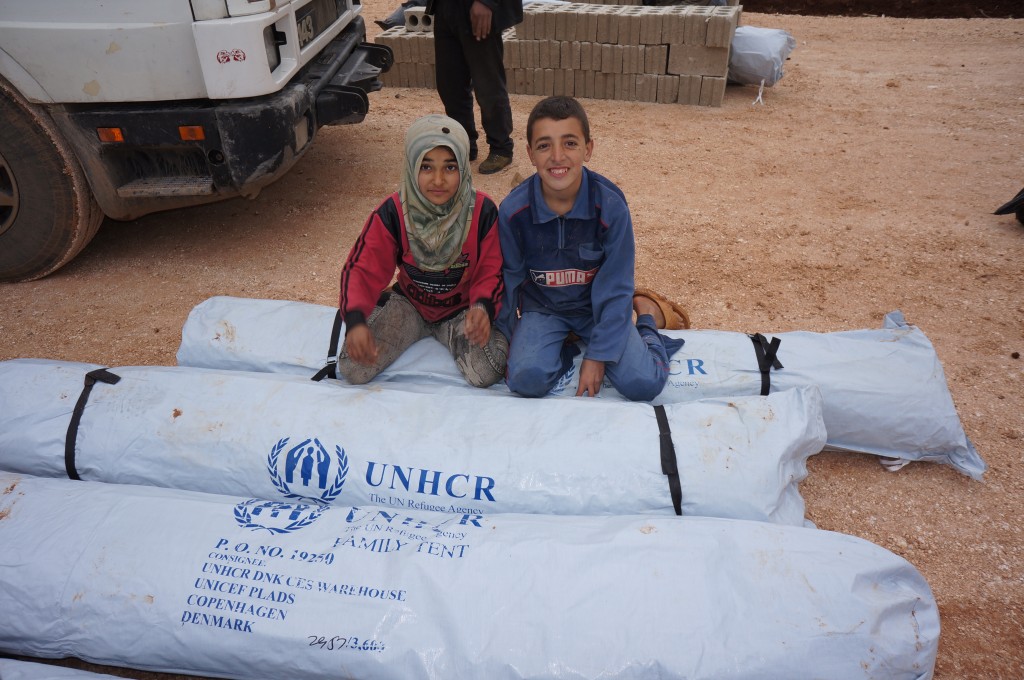It’s Time for a Serious Discussion About Syria
Editor’s note: This piece was originally published in The Huffington Post. I have some great news, folks! You don’t have to wait for a congressional vote to do something to help Syrian refugees and displaced families. You can act right now. With the media inundating the airwaves with news of chemical gas attacks, potential airstrikes, […]
Editor’s note: This piece was originally published in The Huffington Post.
I have some great news, folks! You don’t have to wait for a congressional vote to do something to help Syrian refugees and displaced families. You can act right now.
With the media inundating the airwaves with news of chemical gas attacks, potential airstrikes, and political jockeying, it’s understandable that it may be difficult to sift through the noise to truly comprehend the human aspect of the Syrian Refugee Crisis. So here are some quick facts to dazzle your friends with how much you know about what has been happening even before all the talk of limited air strikes:
- According to documents released by the UN, as of Tuesday, September 3, the number of Syrian refugees passed two million. An average of five thousand people are seeking sanctuary each day. The number of displaced people within Syria remains around 4.25 million.
- United Nations High Commissioner for Refugees (UNHCR) envoy Angelina Jolie reports that “”If the situation continues to deteriorate at this rate, the number of refugees will only grow and some of the neighboring countries could be brought to the point of collapse.””
- UNICEF’s #ChildrenofSyria site reports that in the past year, about two million Syrian children have dropped out of school. That’s about 40% of all pupils registered in grades 1 through 9.
- Within the refugee camps, UNICEF reports that in Lebanon, there will be close to 550,000 school-aged Syrian children by the end of the year, compared to the 300,000 Lebanese children currently in the public schools.
- In Iraq, 90% of refugee children living in host communities are not attending school.
This is a complex humanitarian crisis that requires not only the brute power of the world’s nations, but also the collective generosity of its people. We’re talking about it like it’s a war game, but people have been suffering for years. This is a generational recovery: the Children of Syria are not yet lost.
There are several components in play right now, and it’s vital to keep them all in mind when responding to this crisis. The first component is the refugees that fled. They are currently living abroad in an unfamiliar land with no support system and no resources; remember, they fled their homes, and they have nothing now. The second component is the internally displaced people (IDPs) remaining within Syria. They not only lost everything, they are still in danger within the Syrian borders. They need rapid solutions and they need compassionate empathy. The third factor, the one most often forgotten, is the countries that do not have the infrastructure to house all these refugees. Jordan, Turkey, Lebanon, and Iraq have cried out for help — their lives are also being disrupted by this crisis.
To provide a frame of reference within America, eight years ago over one million people evacuated Southeast Louisiana. The only available evacuation route was northwest to Baton Rouge. I cannot express the alarm I felt when I realized what that influx of people would do to the infrastructure of my city. The population of Baton Rouge doubled as displaced people sought shelter. The state set up over 100 shelters, 6 out of 10 homes hosted people for up to nine months after the storm, we built new schools, and trailer communities were set up that remained in the city for years. Baton Rouge was able to mobilize and handle this crisis, but it took a toll on all. The Governor’s Office of Homeland Security and Emergency Preparedness (GOSEP) predicts that the full recovery from Hurricane Katrina could take another ten years, and the Federal Emergency Management Agency (FEMA) has only just closed the books on Hurricane Andrew. When was Andrew again? Exactly: I barely remember over twenty years ago.
And while these crises were mostly of an environmental nature, and not the machinations of an individual or government, this happened here on our soil. On the anniversary of 9/11, let us remember the innocent people who lost their lives to manmade acts of a sinister nature. Acts like these happen on a small scale in households and neighborhoods every day across America. I don’t like comparing crises, so I emphasize that these are only examples to provide better perspective. The humanitarian crisis in Syria and surrounding nations is both massive and complex, and hundreds of thousands have lost their lives to bloodshed, malnutrition, and disease. We have resources, infrastructure, and clean water in America, and we have to share this privilege now. Our power is in our checkbooks, not in our arsenals.
That said, what specifically can you do? It is so easy to reach out and help people right now by sending cash donations that can be used efficiently. In the South particularly, we love our football. On the weekends, we spend exorbitant amounts of extra money preparing for our football games. There are many opportunities for you to save in little ways that aren’t noticeable to you, but can change the future of a family uprooted from its home. For example, according to the UNHCR’s donation page:
• $55 can buy tools and seeds so that a family can start their own garden and grow staples and vegetables. At a football game, that amount of money basically just buys a tailgate and some frivolous paraphernalia. How about you stay home and just play a board game? For anyone under forty, a board game is… just kidding!
• $100 buys a family a survival kit that includes a blanket, a mattress, a kitchen set, a stove, and soap. Can you imagine how much this could change the lives of a family? It’s the same price as a pair of Citizen’s of Humanity jeans you’d buy for the game. Everyone’s too drunk to notice how well they fit you anyway: don’t buy Citizens of Humanity, be a citizen of humanity.
• Note to self: stay away from Saks! Do not buy that overpriced pair of yummy Michael Kors pumps. They look great, but they’re completely inappropriate for the game, and you’ll probably just fall down the grandstand stairs. That $345 can buy a whole family a tent or a shelter.
• $1,000 can buy therapeutic nutrition kits that can save one hundred children suffering from severe malnutrition. That’s not even enough cash to purchase the special edition purse Kate Spade designed in your team’s colors. Which, by the way, everyone is going to tell you they like, but it’s just trendy. You helping one hundred children suffering from malnutrition? That’s amazing. Trendy or amazing: you do the math.
• And if you are in a position to give more, you can help doctors save more lives, and help mitigate the mental health trauma the refugees and those assisting the refugees are experiencing.
George Eliot once said, “What do we live for, if it is not to make life less difficult for each other?” The refugees do not need a congressional vote, they need cash in order to save their lives and to purchase a viable recovery. The neighboring countries and citizens of these countries need aid as well. USAID’s Center for International Disaster Information (CIDI) has some great Guidelines for Donors. Also, there is InterAction, an alliance organization of U.S.-based international organizations. They list a number of varied organizations in their consortium through which you can give in order to assist those impacted by the crisis. Also consider the Center for Disaster Philanthropy for continuous updates on the crisis.
Remember, this is happening in America too. Displacement and resettlement is only going to get more extreme on American soil as well as all over the world owing to environmental reasons. As a resident of the Gulf Coast, we could be witnessing a similar future. We do not need to wait for Congress’ approval to show smart compassion and to give Syria’s children a future.
More like this
When Disaster Strikes, Who Are We Going to Call?

